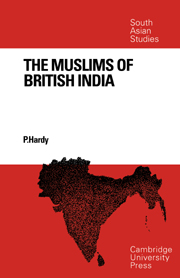Book contents
- Frontmatter
- Contents
- A note on spelling
- Acknowledgements
- 1 Introduction: the medieval legacy
- 2 The effects of British rule on Muslims before 1857
- 3 1857 and its aftermath
- 4 Muslims come to terms with British India as Muslims
- 5 Muslims move towards political community 1871–1901
- 6 Muslims acquire a constitutional identity and enter all-India politics
- 7 Religion enters politics 1910–24
- 8 The period of frustration 1924–35
- 9 The two partitions: of British India and of the Muslim community
- Maps
- A descriptive bibliography of works in European languages
- Glossary
- Index
4 - Muslims come to terms with British India as Muslims
Published online by Cambridge University Press: 19 October 2009
- Frontmatter
- Contents
- A note on spelling
- Acknowledgements
- 1 Introduction: the medieval legacy
- 2 The effects of British rule on Muslims before 1857
- 3 1857 and its aftermath
- 4 Muslims come to terms with British India as Muslims
- 5 Muslims move towards political community 1871–1901
- 6 Muslims acquire a constitutional identity and enter all-India politics
- 7 Religion enters politics 1910–24
- 8 The period of frustration 1924–35
- 9 The two partitions: of British India and of the Muslim community
- Maps
- A descriptive bibliography of works in European languages
- Glossary
- Index
Summary
The British government in India was now ready to offer the chalice of reconciliation – but was it poisoned? No doubt Muslims had suffered military defeat and political humiliation before in their history, both in India and elsewhere, but they had not been asked then to submit to a new syllabus of study for success in life, which appeared to ask them to deny Islam as the one true religion. To agree to see the future as the British painted it - was this not to deny their past and to acknowledge that Islam was not the true order of the universe? To accept that an education on English lines was a necessary passport to success and consideration was tantamount to recognising that Muslim education was out of keeping with the requirements of the age – perhaps that Islamic belief itself was an anachronism. To live on the British terms could mean acknowledgement in practice that history would never become Islamic, that the temporal order in the age of Western dominance had escaped God's will and pleasure. The Indian Muslim could be forgiven for thinking that the British were asking him to commit that same sin of shirk which traditional Islamic doctrine held the British to be committing in proclaiming the separation of religion and politics to be the principle of ‘progress’.
The vast majority of Muslims in India were in no position to distress themselves over the religious issues at stake – they were sufficiently distressed over the problem of keeping alive.
- Type
- Chapter
- Information
- The Muslims of British India , pp. 92 - 115Publisher: Cambridge University PressPrint publication year: 1972



